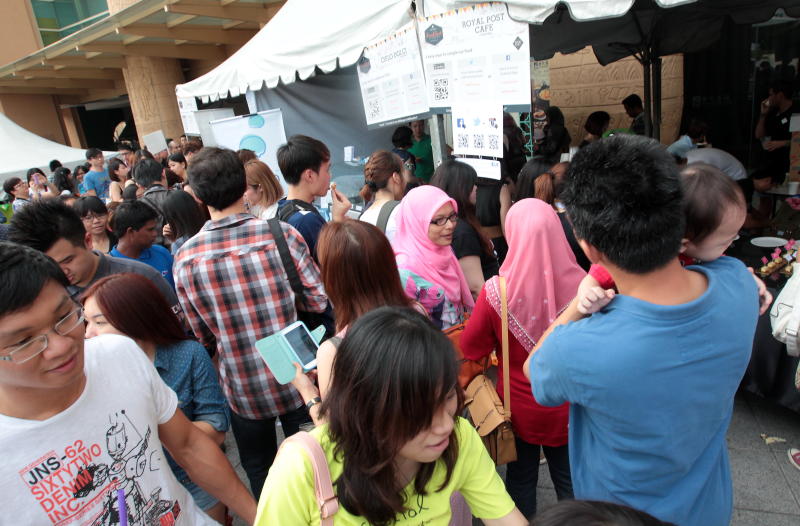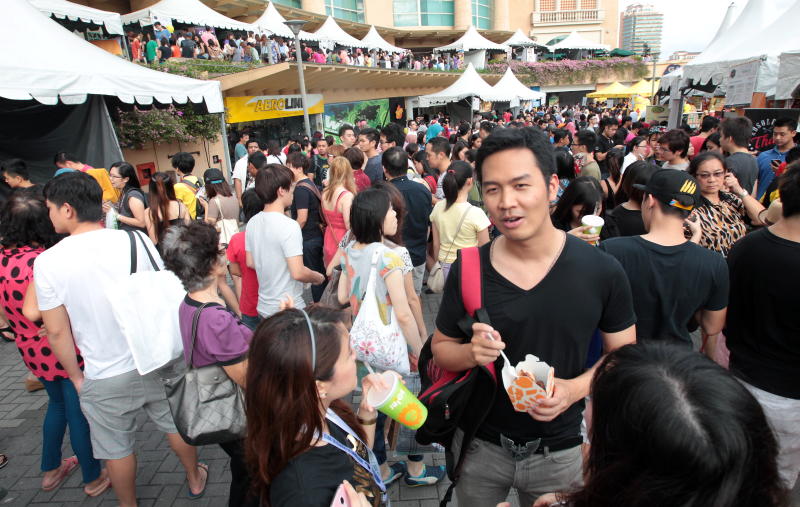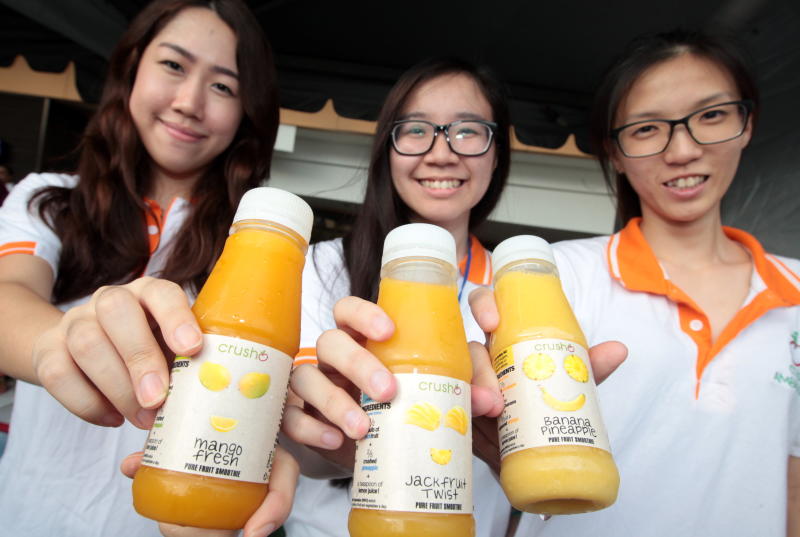By KEVIN TAN and CHRISTINE CHEAH
alltherage@thestar.com.my
You tweet, you eat – that was the basic concept behind last week’s Nuffnang FoodFest.
Instead of paying for your food from one of the many vendors at the event, all you have to do is tweet about the vendor through a special mobile app (which you can use to scan a QR code for each vendor), and you’ll get a free portion of their culinary creations.
As novel as the idea sounds, if you really think about it, it’s actually a no-brainer. If there are two things we know Malaysians love, it’s food and social media.
A Forbes Asia article published last year said there are over 12 million Facebook users in Malaysia, making us Asia’s fifth largest Facebooking country.
And now, independent food businesses – that rely more or less completely on the power of social media – are popping up everywhere, selling everything from coloured burgers (like Crayon Burger) to artisanal marshmallows (Fête Artisan Marshmallows).
When R.AGE first wrote about independent food businesses last year, there were only a handful that were starting to make it big. Now, there’s an entire food festival dedicated to promoting them alongside other big name franchises.
A huge crowd turned up for the Nuffnang FoodFest, and their constant tweeting had the event hashtag (#NNFoodFest) trending in Malaysia.
So is this the start of the digital food revolution in Malaysia? It sure seems that way.
Facebook food
Julian Chow, 28, and Carmen Cheong, 29, from Fête Artisan Marshmallows have been in business for a year now, and they have relied solely on social media platforms to promote their products.
“We don’t have a physical store. It was very clear to us once we started the business – we had to get our products out there through Facebook,” said Chow.
Their social media strategy has seen sales of their marshmallows (home-made, like most independent food businesses) increase from around 10 orders a month to almost 60.
On top of that, they now distribute their products to nine different F&B outlets in the Klang Valley (mostly cafes), and they’re regulars at food festivals as well.
Nuffnang manager for talent and community Shahzeeq Shahren said the FoodFest was all about helping such food businesses.
“These vendors have put value in their food through Twitter, and now we have this social media currency (for them to leverage on),” he said.
In March, Kenner Tham, 34, Sam Lai, 26 and K.Y Lim, 26, the founders of The Royal Post cafe, came up with an idea to take their business to the streets. And that’s how the Mobile Espresso Bar came about, a truck that drives around the Klang Valley selling their products.
“We thought instead of waiting for customers to come to us, why don’t we go to their doorsteps?” said Tham. “We tell people where we are, and where we’re planning to go, on Facebook, Twitter and Instagram. That’s where our consumers look for products anyway.”
And just like it did with Fete, the new social media strategy has paid off for The Royal Post. Business has gone up by 50%.
Despite having a physical shop, unlike many independent food businesses, Tham believes the Mobile Espresso Bar is The Royal Post’s biggest selling point, with customers often going to their social media accounts asking them to visit certain places.
Social secrets
To market a food business successfully on social media, Chow said brands have to engaging and constantly updated.
“It’s important to constantly tell people what’s happening, just to let them know you are around. Social media like Facebook allows you to have that interactivity,” he said.
Tham has a team at the Royal Post dedicated to managing their social media in order to create that constant interaction. “I make sure we are able to respond to our customers speedily. We respond to every comment or message within 10 minutes, if not immediately.”
Crush, a beverage brand started only three months ago, is taking the same approach. They have no physical store, and they rely solely on social media marketing, with their products sold mainly at events and food festivals like the Nuffnang FoodFest, where they were one of the vendors.
“We are a very new brand, and while not many people know about us, we want to be where everyone is – on social media,” said Crush marketing manager Lowen Lo, 27. “It’s not just an effective way to reach our audience, but it is cost-effective too.”
Stumbling blocks
As much as social media might seem like the magic marketing solution for all independent food businesses, there are drawbacks. Crayon Burger in Subang Jaya, Selangor has been gaining visibility on social media with their coloured burger buns (like the one featured in our cover photo), but co-founder Christian Teo, 21, urges caution.
“We use social media as our main marketing tool because it’s more appealing to the younger crowd, but we can’t control what people say (about us on social media). Everyone has their own opinions,” he said. “But it does help point out some of our problems to us.”
Tham added that by relying solely on online marketing, brands could risk losing out on physical encounters with consumers, which was why The Royal Post created their Mobile Espresso Bar in the first place.
And according to Chow, some people might perceive brands as “unprofessional” if they are based solely on social media. The key to unlocking its potential, he believes, is understanding the medium well and making sure it works for you.
“For us, we operate sales on Facebook – we take orders and allow people to get in touch with us,” he said.
Nevertheless, Chow said food start-ups shouldn’t be afraid of taking the social media route, instead of always obsessing about how to own a physical store.
“When people think about starting a business, they always think about the capital to rent a place and the other costs (that come with it). But many successful businesses started out small first, utilising what they have – and social media platforms like Facebook are completely free for everyone.”







Tell us what you think!